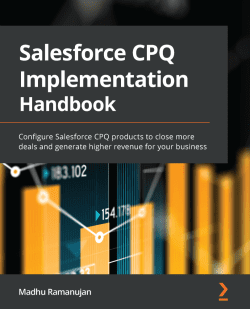Madhu Ramanujan is the author of The Salesforce CPQ Implementation Handbook; we got the chance to sit down with her and find out more about her experience of writing with Packt.
Q: What are your specialist tech areas?
Madhu: Salesforce, Sales cloud, Service cloud, Communities, CPQ, Mulesoft, Customizations, Integrations and Enterprise Architecture.
Q: How did you become an author for Packt? Tell us about your journey. What was your motivation for writing this book?
Madhu: I have experience with multiple CPQ implementations. With a Salesforce Architect background that came in handy, last January I embarked on this new project.
Q: What kind of research did you do, and how long did you spend researching before beginning the book?
Madhu: I read a lot of Salesforce documentation/blogs and watched a number of YouTube videos on CPQ and interfacing with subject matter experts.
Q: Did you face any challenges during the writing process? How did you overcome them?
Madhu: There was always a lot of content to present. It was really hard to satisfy the wide variety of audiences. Consolidating the information, summarizing, and presenting the details was challenging. Few chapters like Industries CPQ, Migration and Billing can each be a separate book.
Q: What’s your take on the technologies discussed in the book? Where do you see these technologies heading in the future?
Madhu: Salesforce is always adding a lot of new features to CPQ. Industry-specific CPQ is another area that Salesforce is focussing on making the CPQ usage as widespread as possible.
Q: Why should readers choose this book over others already on the market? How would you differentiate your book from its competition?
Madhu: I don’t think there are any CPQ implementations in the Market. And this gives the end to end implementation details to any business
Q: What are the key takeaways you want readers to come away with from the book?
Madhu: This book provides the foundational knowledge covering multiple use cases that can be configured. CPQ can be implemented in-house without external vendor help.
Q. What advice would you give to readers learning tech? Do you have any top tips?
Madhu: One percent better everyday
Q. Do you have a blog that readers can follow?
Madhu: No
Q. Can you share any blogs, websites and forums to help readers gain a holistic view of the tech they are learning?
Madhu: Salesforce Trailhead, forums and blogs
Q. How would you describe your author journey with Packt? Would you recommend Packt to aspiring authors?
Madhu: Packt’s journey was eventful and in the process of writing this book, I discovered some strengths that include presenting ideas without making any major assumptions about readers, concisely present thoughts, though the concepts can be complex or difficult to understand, to name a few.
Q. Do you belong to any tech community groups?
Madhu: Salesforce CPQ, Trailhead community groups, RAD Women and a lot of Salesforce community groups.
Q. What are your favorite tech journals? How do you keep yourself up to date on tech?
Madhu: Salesforce conferences, community groups, and reviewing new features that are part of the Salesforce release cycle.
Q. How did you organize, plan, and prioritize your work and write the book?
Madhu: Make a delicate balance between work needs, researching the topics to focus on for the week, and iterating on content multiple times.
Q. What is that one writing tip that you found most crucial and would like to share with aspiring authors?
Madhu: Make it a point to spend time everyday without fail. It will be hard initially, but with persistence and discipline make it a point to spend a few minutes researching and writing notes about your thoughts. Refinement happens over a period of time.









